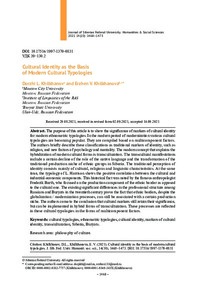Cultural Identity as the Basis of Modern Cultural Typologies
Скачать файл:
URI (для ссылок/цитирований):
https://elib.sfu-kras.ru/handle/2311/144696Автор:
Khilkhanov, Dorzhi L.
Khilkhanova, Erzhen V.
Хилханов, Д. Л.
Хилханова, Э. В.
Дата:
2021-10Журнал:
Журнал Сибирского федерального университета. Гуманитарные науки. Journal of Siberian Federal University. Humanities & Social Sciences; 2021 14 (10)Аннотация:
The purpose of this article is to show the significance of markers of cultural identity for modern ethnometric typologies. In the modern period of modernization various cultural typologies are becoming popular. They are compiled based on multicomponent factors. The authors briefly describe these classifications as traditional markers of identity, such as religion, and new factors of psychology and mentality. The modern concept that explains the hybridization of modern cultural forms is transculturation. The transcultural manifestations include a certain decline of the role of the native language and the transformation of the traditional production niche of ethnic groups in Siberia. The traditional perception of identity consists mainly of cultural, religious and linguistic characteristics. At the same time, the typologу of L. Harrison shows the positive correlation between the cultural and industrial-economic components. This historical fact was noted by the famous anthropologist Frederik Barth, who focused on the production component of the ethnic border as opposed to the cultural one. The existing significant differences in the professional structure among Russians and Buryats in the twentieth century prove the fact that ethnic borders, despite the globalization / modernization processes, can still be associated with a certain production niche. The authors come to the conclusion that cultural markers still retain their significance, but can be implemented in hybrid forms of transculturation. These processes are reflected in these cultural typologies in the forms of multicomponent factors Цель данной статьи – показать значение маркеров культурной
идентичности для современных этнометрических типологий. В современный период
модернизации популярными становятся различные культурные типологии. Как
правило, они составляются на основе многокомпонентных факторов. В своей статье
мы показываем, что в основе этих классификаций лежат как традиционные маркеры
идентичности, например религия, так и новые комплексные факторы, относящиеся
к психологии и мировоззрению. Современной концепцией, объясняющей неизбежную
гибридизацию культурных форм, является транскультурация. К транскультурным
проявлениям мы относим снижение роли родного языка и трансформацию
традиционной производственной ниши этносов в условиях Сибири. Традиционное
восприятие идентичности складывается преимущественно из культурных, религиозных
и языковых признаков. В то же время рассмотренные нами типологии (например,
типология Л. Харрисона) обосновывают взаимосвязь культурной и производственно-экономической
составляющей. Данный факт отмечал норвежский антрополог
Фредерик Барт, который акцентировал внимание на производственной составляющей
этнической границы в противовес культурным. Существующие значимые различия
в выборе профессий у русских и бурят в ХХ веке доказывают тот факт, что этнические
границы, несмотря на глобализационные/модернизационные процессы, могут
быть связаны с определенной производственной нишей. В качестве заключения мы
отмечаем, что культурные маркеры по-прежнему
сохраняют свое значение, но могут
реализовываться уже в гибридных формах транскультурации. Данные процессы
отражены в рассмотренных типологиях в виде многокомпонентных факторов
Коллекции:
Метаданные:
Показать полную информациюСвязанные материалы
Показаны похожие ресурсы по названию, автору или тематике.
-
Childhood: New Socio-Cultural Trends in Modern Russia
Karlova, Olga A.; Lapkov, Alexei V.; Карлова, О.А.; Лапков, А.В. (Сибирский федеральный университет. Siberian Federal University, 2016-12)This article analyzes some of the relevant aspects of childhood in the context of social and cultural changes of the Russian society in the first decades of the 21st century. The authors seek to understand the prevailing ... -
Criteria of Mutual Understanding in Cross-Cultural Communication
German, Natalya Ph.; Н.Ф. Герман (Сибирский федеральный университет. Siberian Federal University, 2009-05)In this article the phenomenon of linguacultural identity of the subject of communication is considered as the main factor having an affect on the mutual understanding in the process of interaction. Linguacultural identity ... -
The Problematic Aspects of Cultural Policy in Modern Tuva
Karelina, Ekaterina K.; Карелина, Е.К. (Сибирский федеральный университет. Siberian Federal University, 2018-02)The article is devoted to the analysis of the cultural politics in Tuva and is focused on the problematic aspects of its current development. It is the result of reflection on personal participation in the cultural policy ... -
On the Issue of Tungus Component in the Traditional Clothing of Dolgans: Even-Dolgan Parallels
Savvinov, Anatoly I.; Саввинов, А.И. (Сибирский федеральный университет. Siberian Federal University., 2016-10)The Dolgans is the northernmost small-numbered Turkic speaking people, mainly living in the North of the Krasnoyarsk Territory, as well as in Anabar ulus of the Republic of Sakha (Yakutia). Dolgans’ traditional activities ... -
Phenomenon of the Cultural Policy Influence on the Urban Environment Formation in Modern Humanitarian Studies
Luzan, Vladimir S.; Лузан, В.С. (Сибирский федеральный университет. Siberian Federal University, 2016-06)In the course of globalization processes the theory and practice of socio-economic relations in modern world shows that cities will play a key role in the development of state and interstate associations in present and ...

